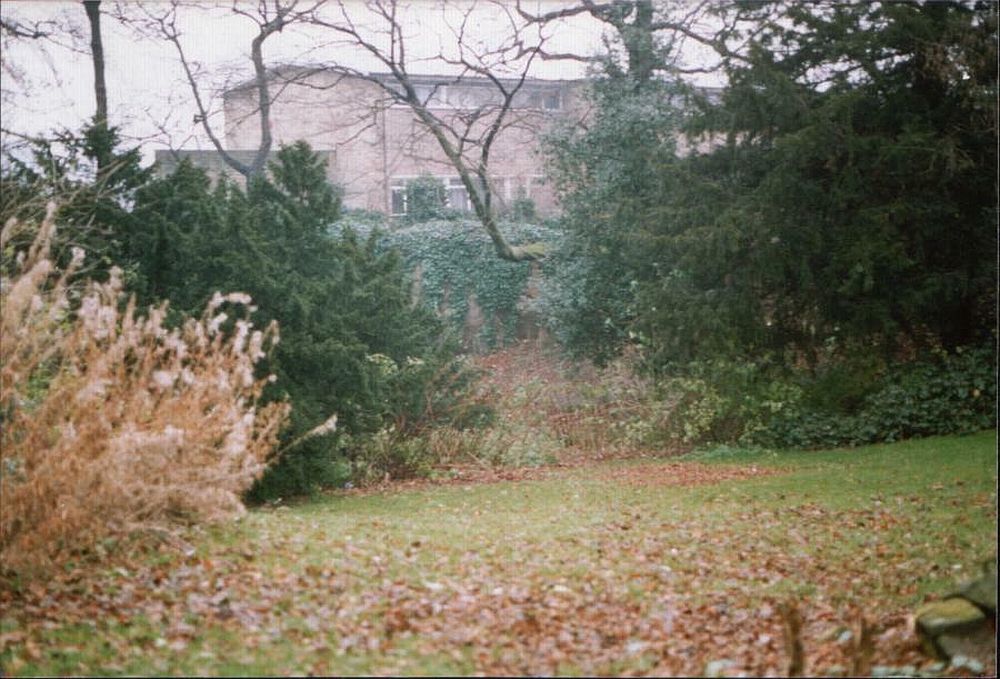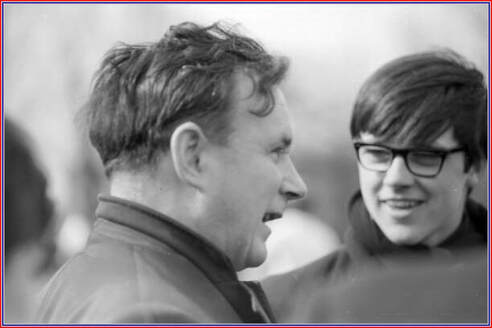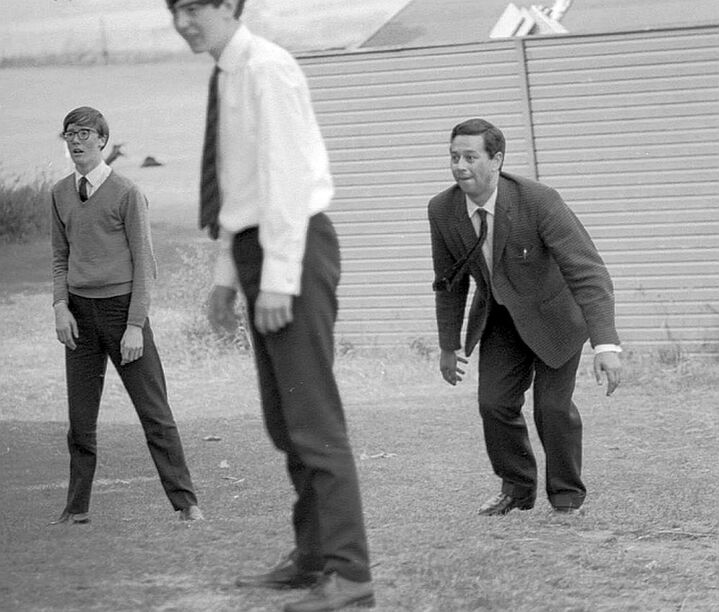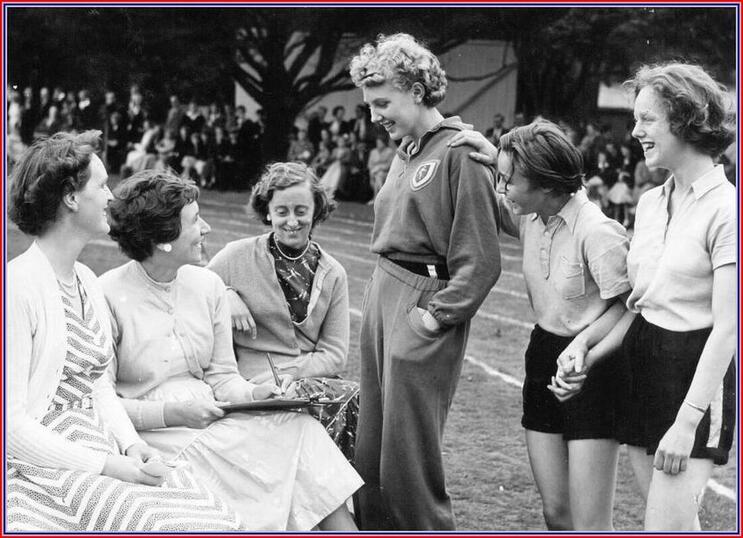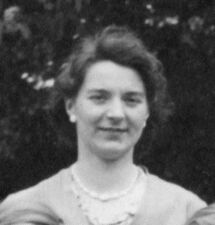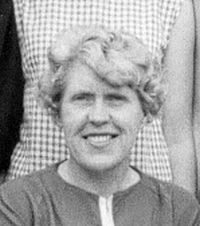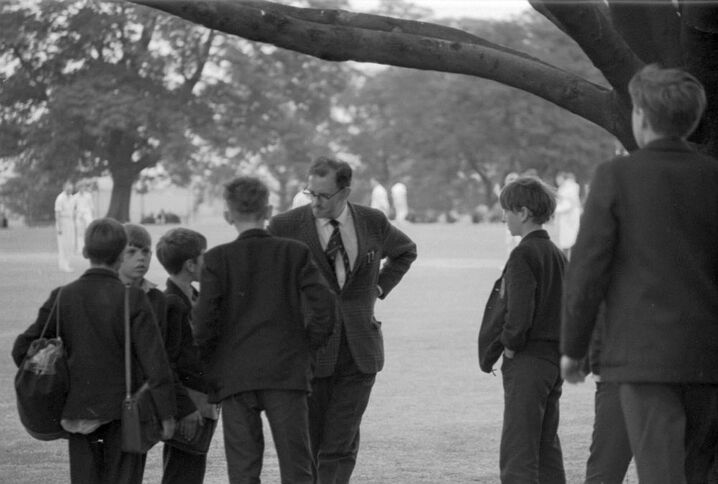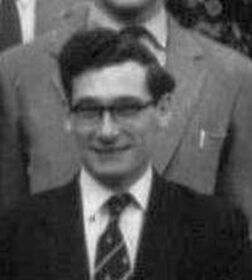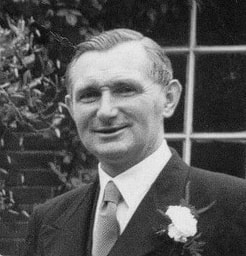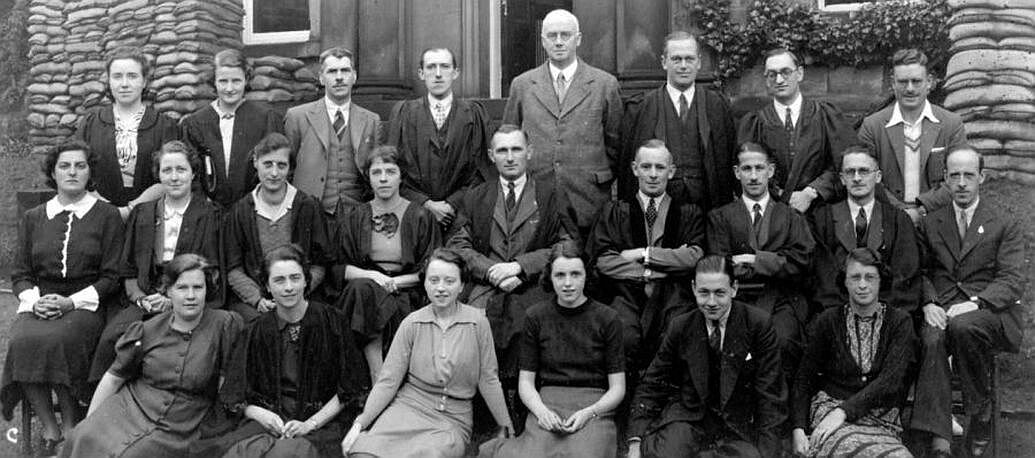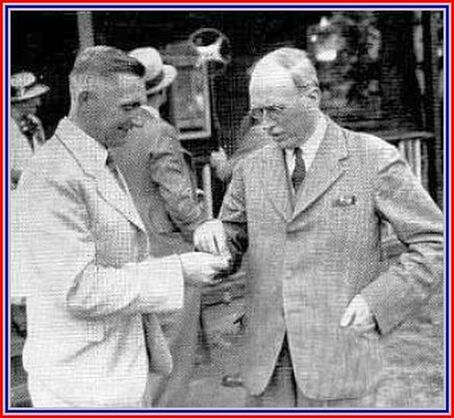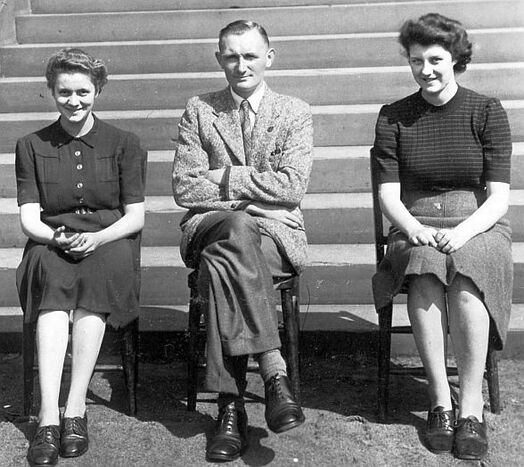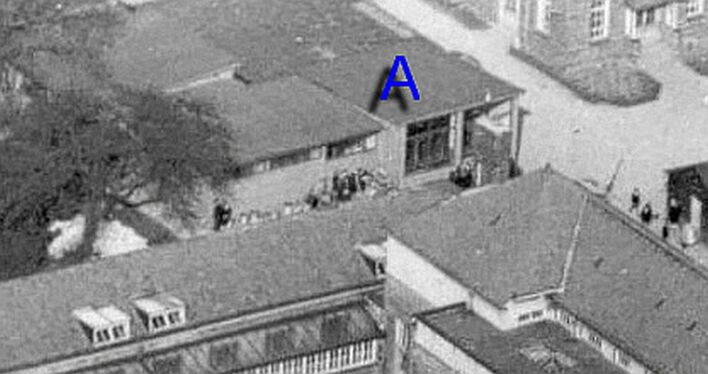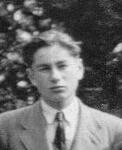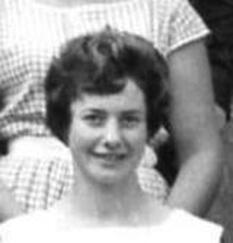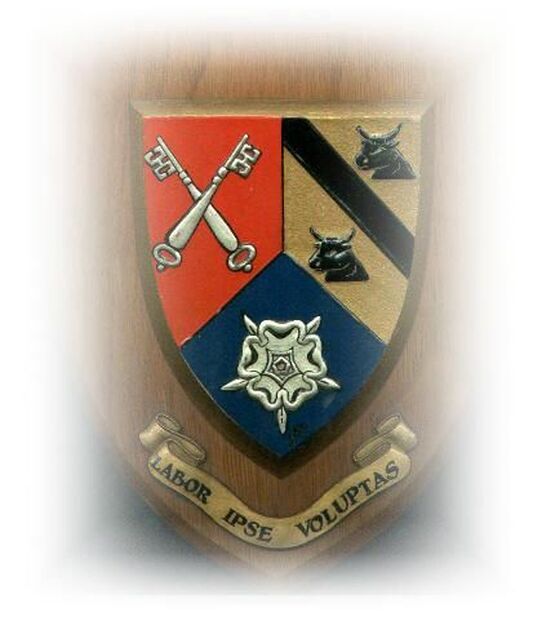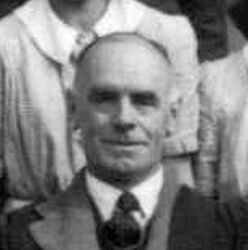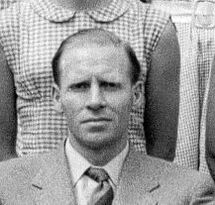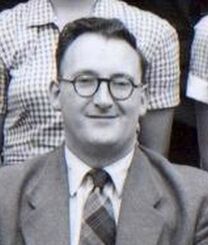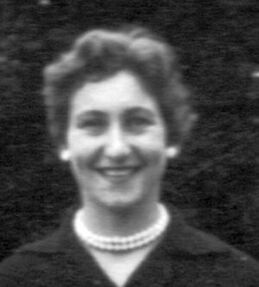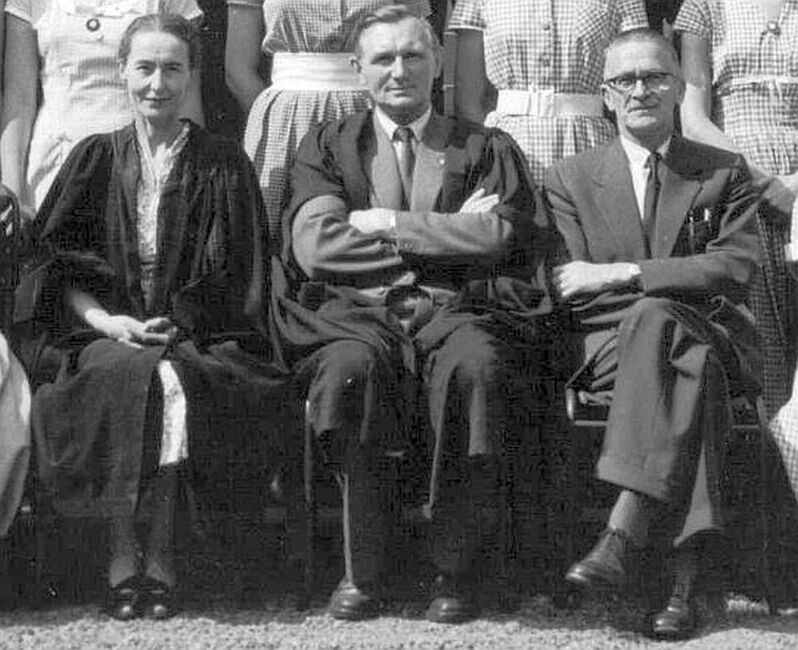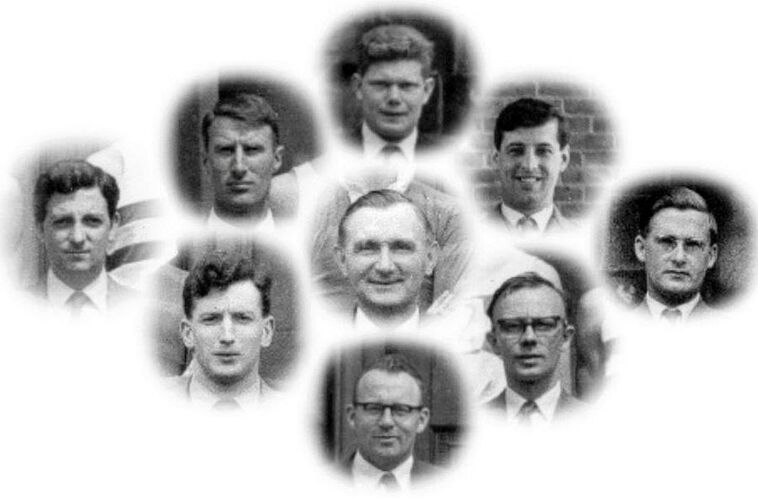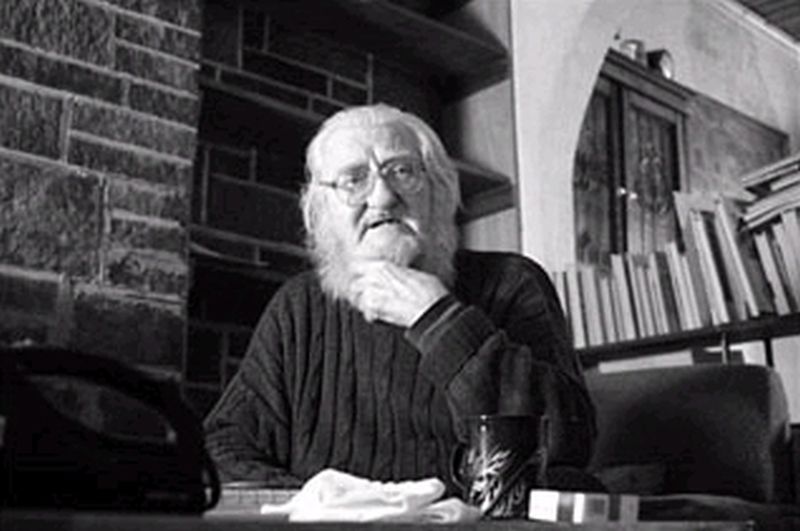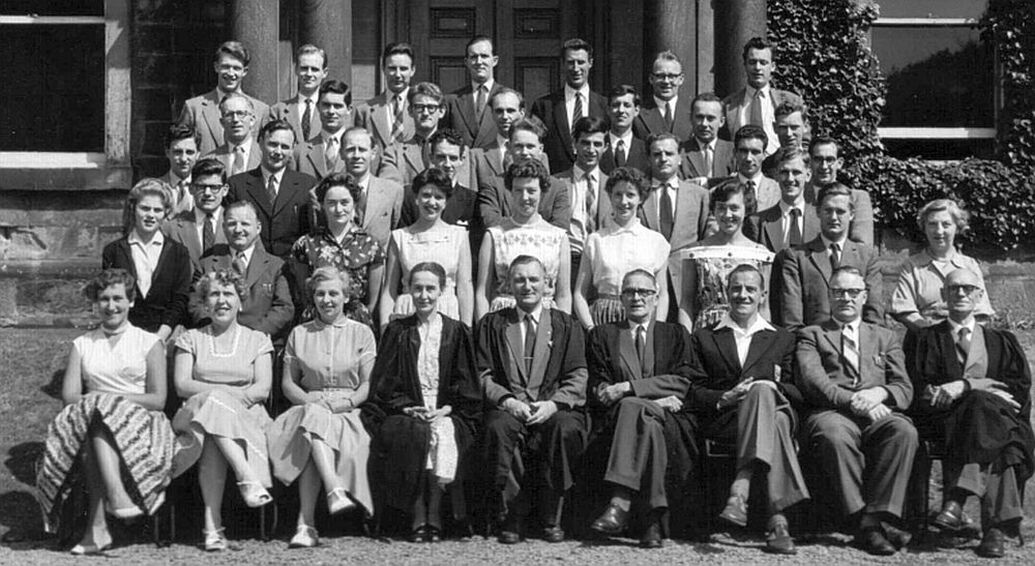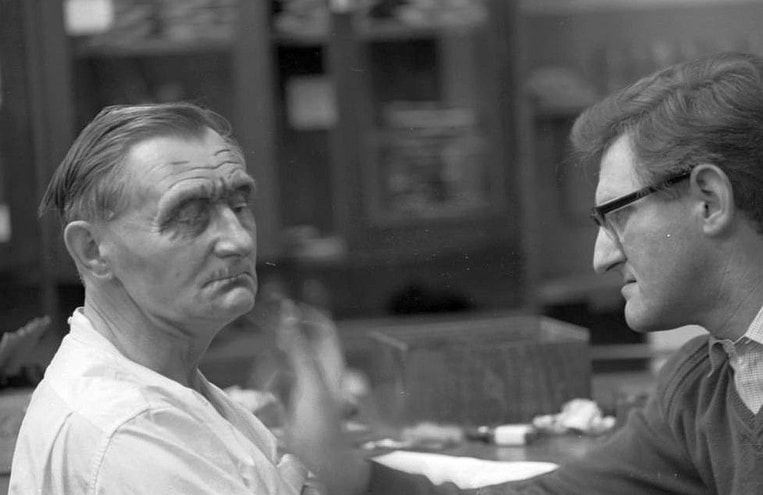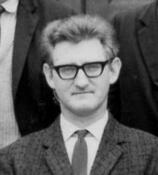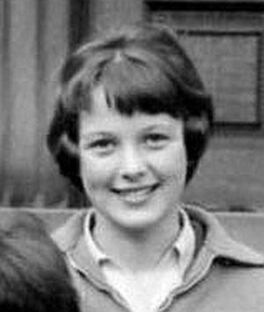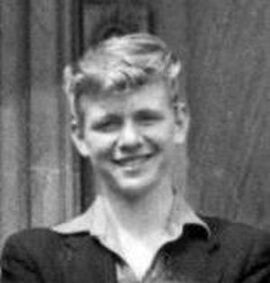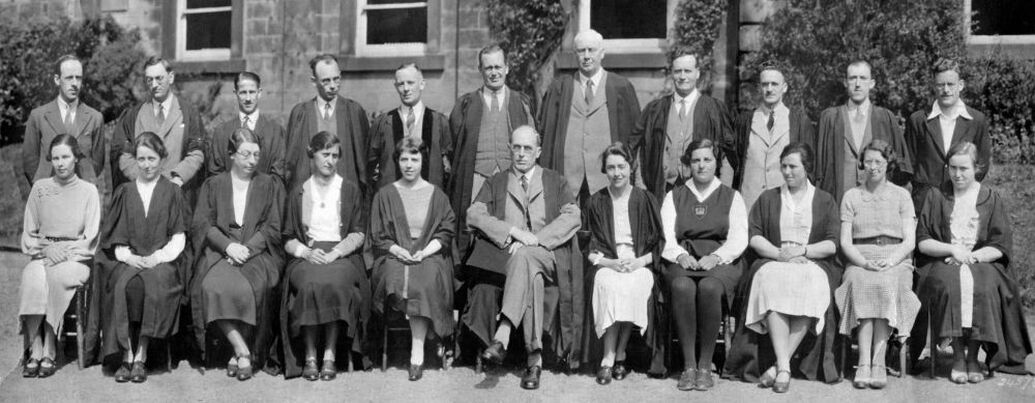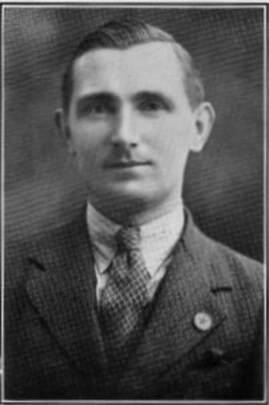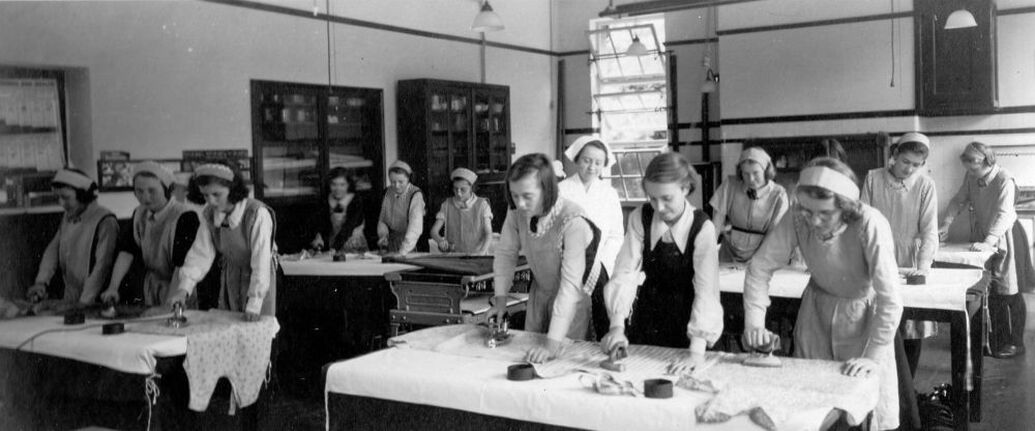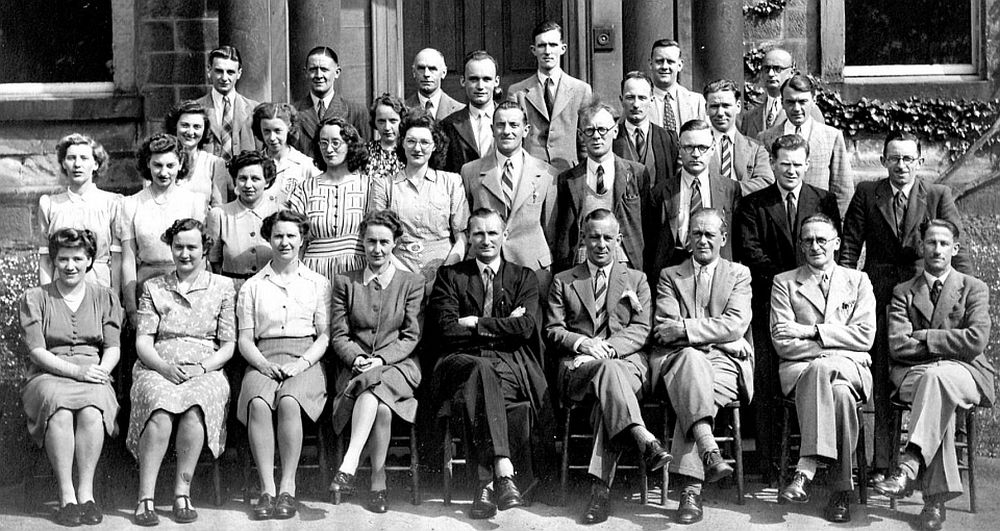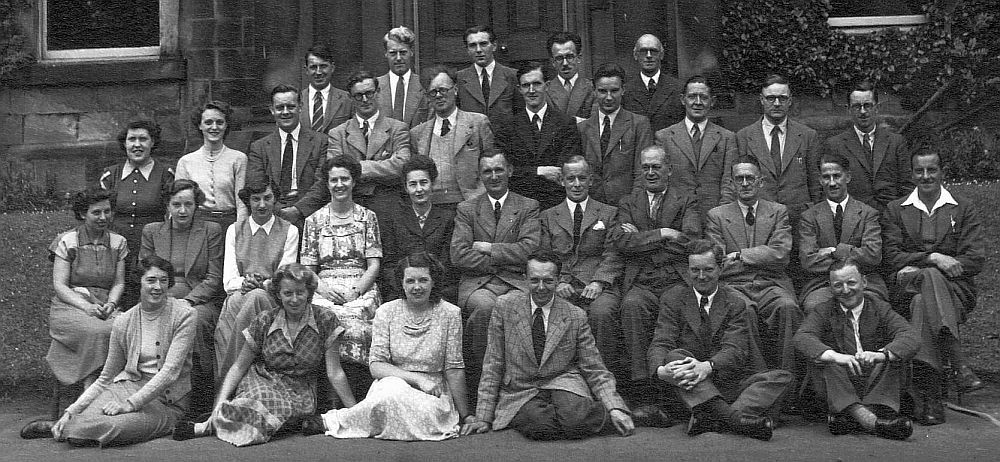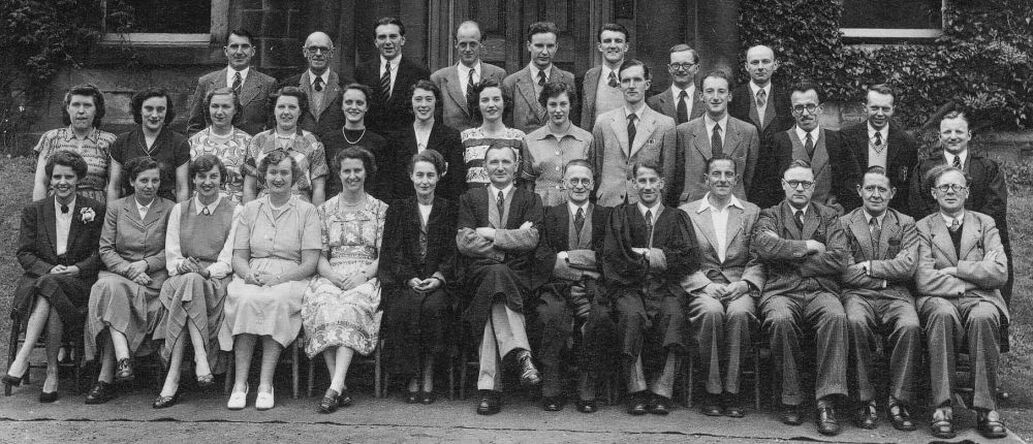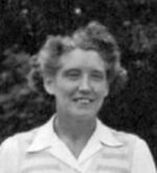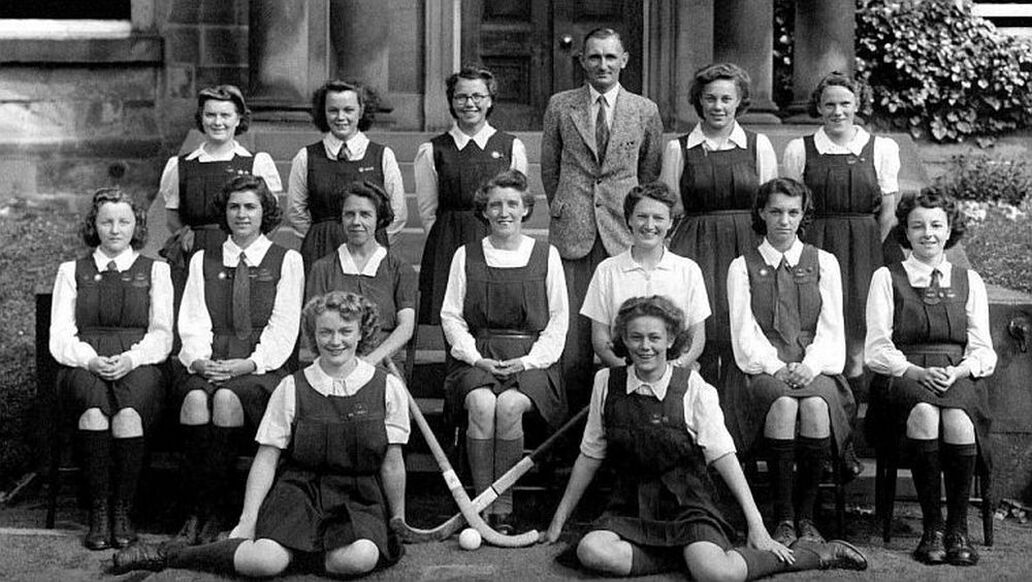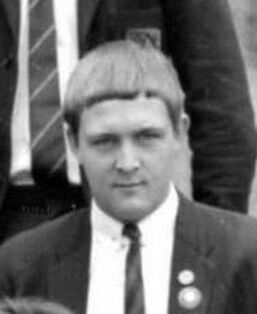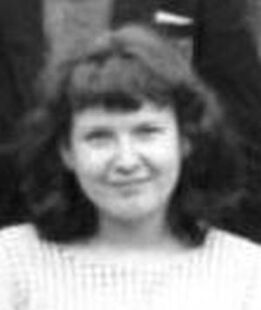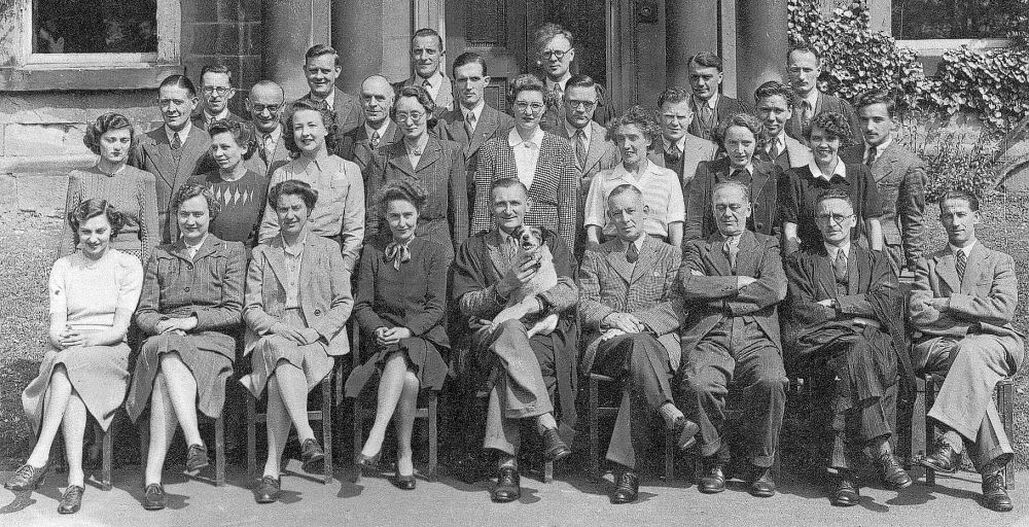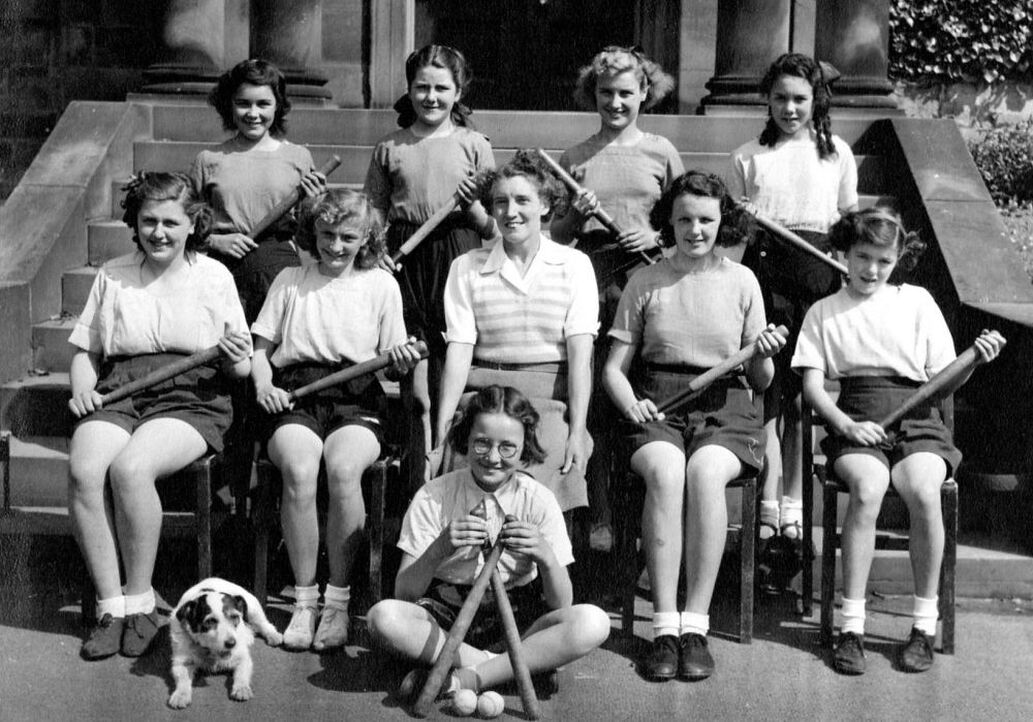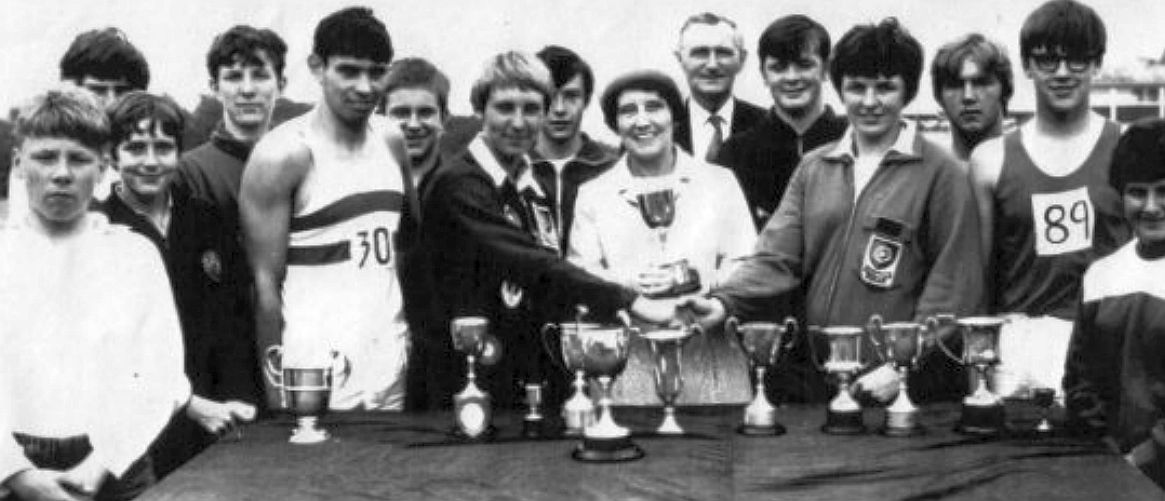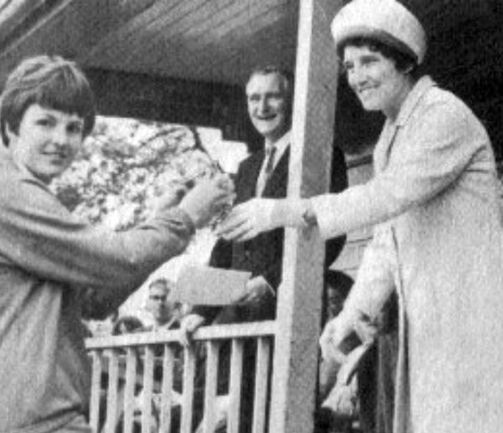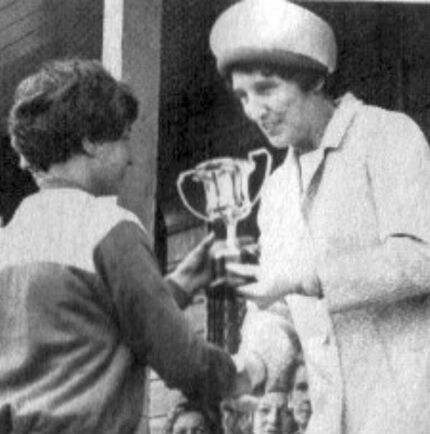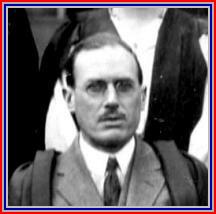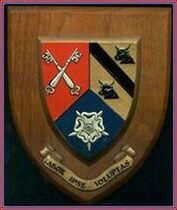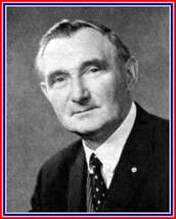A Personal View 12
Status: 10 articles/views
Updated: 07.08.2021
The articles below may be updated at any time.
Status: 10 articles/views
Updated: 07.08.2021
The articles below may be updated at any time.
The Dell on a misty, autumn day.
"The untidiness of Autumn lay all around."
from Sheila
"The untidiness of Autumn lay all around."
from Sheila
Table of Contents
|
1. Relaxed and purposeful or not
2. The rock of stability, no matter what. 3. Memories for everyone 4. Janet Noble writes it down 5. S.M.T. 1955-62 |
6. Mr Hamilton's Planning
7. Mr Burnell 8. Worried teaching Staff of HGS 1936-37? 9. Staff changes in the 1940s. 10. Mrs Hamilton |
1. Relaxed and purposeful or not
Photo below: Mr Davies chats to Steve Womersley
Photo below: Mr Tromans joins in the game and breaks down boundaries
After the race on Sports Day 1957
The recorders chat to the girls from the race. Smiles from everyone. Great picture!
The recorders chat to the girls from the race. Smiles from everyone. Great picture!
The top image shows Mr Davies chatting to Steve Womersley. It is an example of what I consider to be very important in schools. It is a form of Informal organisation which develops when people are relaxed about crossing formal boundaries and developing a social relationship. The latter can help with the required work within the school. Stress in the work environment is certainly reduced. I encountered this positive situation immediately on entering HGS thanks to Miss Collins, our Form Teacher. In the Second Form I looked forward to Miss Ward's lessons as I knew they would be pleasant and relaxed.
Another example was the fact that Mr Collette always called me "Mac". To me this was important and meant that Mr Collette wanted to break down the rule, and formal barrier, that boys should be referred to by their surname only. Mr Pacy did the same. Mr Hamilton only ever called me by my surname. Most teachers called me by my surname.
Miss Ward was different. After we "broke the ice" in 2A over a poor History homework she started to call me by my two first names. This had the effect of keeping me in check but at the same time it broke down that formal barrier. When we first met in 2A she asked everyone their name. I was the only boy who gave her his full name including my middle name, not just the first name and surname or surname only. This was something she never forgot. When we were working together in the same department, she would also use it when necessary rather than Dave. My work in 2A hit a low point during the first term and I was way down the Form Positions in History. After she and I broke the ice, I actually rose to second place by the end of the third term probably because I felt comfortable being taught by Miss Ward.
Another example was the fact that Mr Collette always called me "Mac". To me this was important and meant that Mr Collette wanted to break down the rule, and formal barrier, that boys should be referred to by their surname only. Mr Pacy did the same. Mr Hamilton only ever called me by my surname. Most teachers called me by my surname.
Miss Ward was different. After we "broke the ice" in 2A over a poor History homework she started to call me by my two first names. This had the effect of keeping me in check but at the same time it broke down that formal barrier. When we first met in 2A she asked everyone their name. I was the only boy who gave her his full name including my middle name, not just the first name and surname or surname only. This was something she never forgot. When we were working together in the same department, she would also use it when necessary rather than Dave. My work in 2A hit a low point during the first term and I was way down the Form Positions in History. After she and I broke the ice, I actually rose to second place by the end of the third term probably because I felt comfortable being taught by Miss Ward.
|
Miss Collins (1956)
|
Miss Ward (1966)
|
HGS School Rule 1 which was displayed around the school.
Any offence against common sense is an offence against school rules.
Any offence against common sense is an offence against school rules.
Unfortunately some teachers and pupils at HGS gave no indication that they wanted to apply common sense, relax, smile and enjoy the moment. It was a pity that some lessons around the school did not create a positive learning environment. This had both short and long term consequences for the concerned groups, the teachers and the school itself. I was fortunate that the teaching groups in which I found myself had many sensitive and committed individuals who just wanted to work in class, make progress, go home and do their homework. I, of course, was one of those?
Out of lessons, difficult situations could arise and smiles may not have been appropriate as here for Mr Groome during the Annual Staff Cricket Match.
This is obviously a huge topic within education and perhaps here is not the place to develop it. Overall I would make the observation that the groups, forms or classes in which I found myself at HGS were generally well behaved and the teachers responded to that behaviour so that we could all make progress peacefully and do so with a smile.
|
Mr Hodgson
|
Mr Hamilton
|
With some staff, informality and purposefulness were natural parts of their overall personal characteristics. I would give as an example Mr Hodgson. He was only at the school for three years, but Mr Hodgson made a really positive impression on me during lessons. In class discussions, the views of a teenager debating a point with a teacher should be respected if, perhaps, not entirely accepted. He would ask you for your opinion and then discuss your points with you and/or the group. This certainly made you think about the subject more deeply. It was rather like a Group Tutorial or Seminar at University.
In "Headmaster's Period", Mr Hamilton always gave a masterclass in one-to-one discussion. If you disagreed with him he would discuss the point and try to alter your view. As you would probably expect, he "usually" won the argument. Initially I did find that his lessons were stressful but when his true personality came through I relaxed and enjoyed them. However, you always had to be "on your toes".
In "Headmaster's Period", Mr Hamilton always gave a masterclass in one-to-one discussion. If you disagreed with him he would discuss the point and try to alter your view. As you would probably expect, he "usually" won the argument. Initially I did find that his lessons were stressful but when his true personality came through I relaxed and enjoyed them. However, you always had to be "on your toes".
2. The rock of stability, no matter what.
The HGS Staff at the start of very frightening times. Mr Hamilton had to be "the rock of stability".
Below is the HGS Staff of 1939-40
Note the sandbags in front of Room 1 and the Headmaster's Study.
A quote from this article: "The headmaster had a rough time owing to illness of staff, one member of whom, or more, had been off duty throughout the winter. Notwithstanding this setback there would, he was sure, be a determination to recover the lost ground."
Below is the HGS Staff of 1939-40
Note the sandbags in front of Room 1 and the Headmaster's Study.
A quote from this article: "The headmaster had a rough time owing to illness of staff, one member of whom, or more, had been off duty throughout the winter. Notwithstanding this setback there would, he was sure, be a determination to recover the lost ground."
Back Row L-R: Miss Walker, Miss Garman, Mr. Waters, Mr. Scourfield, Mr. Austin, Mr. Storer, Mr. Hyde, Mr. Nelson
Middle Row L-R: Miss Harrison, Miss Bromley, Miss Prince, Miss Shortridge, Mr. Hamilton, Mr. Crossland, Mr. Manning, Mr. Collette, Mr. Hamilton (Art)
Front Row L-R: 1, Miss Kenward, Miss. Euler, 4, 5, Miss Townsend
Middle Row L-R: Miss Harrison, Miss Bromley, Miss Prince, Miss Shortridge, Mr. Hamilton, Mr. Crossland, Mr. Manning, Mr. Collette, Mr. Hamilton (Art)
Front Row L-R: 1, Miss Kenward, Miss. Euler, 4, 5, Miss Townsend
I went to HGS 15 years after this photograph was taken. To me there are only 3 familiar faces. This raises the point that Mr Hamilton must have had to appoint so many teachers and to accept so many resignations during his 30 years as the Headmaster. Continuity with regard to the delivery of the curriculum must have been quite difficult at times. The departure of a valued member of staff can cause problems for the school administration, the involved department(s) and the pupils. As a pupil I found that some teachers were more difficult to work with than others - relaxation was the key. Miss Ward was, for me, the easiest to work with.
Everything to do with HGS pivoted around Mr Hamilton in both good and bad times. The full, all-time teaching staff list is quite large. The list is displayed on this website (Staff Index). To that must be added all the staff employed at the school who had functions other than teaching. These have not been recorded, but the school could not have operated correctly without them. I cannot imagine a school without the cleaning staff and the dinner ladies! We as pupils may not have seen the cleaning staff but we certainly knew and appreciated the dinner ladies. It should not be forgotten that HGS was a local employer for 46 years, 30 of those years through Mr Hamilton.
Everything to do with HGS pivoted around Mr Hamilton in both good and bad times. The full, all-time teaching staff list is quite large. The list is displayed on this website (Staff Index). To that must be added all the staff employed at the school who had functions other than teaching. These have not been recorded, but the school could not have operated correctly without them. I cannot imagine a school without the cleaning staff and the dinner ladies! We as pupils may not have seen the cleaning staff but we certainly knew and appreciated the dinner ladies. It should not be forgotten that HGS was a local employer for 46 years, 30 of those years through Mr Hamilton.
Mr Jenkinson and Mr Hamilton meet in 1937 on Sports Day
As all schools are, HGS was no doubt a dynamic organisation generally responding to changed circumstances with internal system modifications as required. At HGS, however, some elements of the school did not change much at all, such as the school structure and the traditions. Mr Hamilton joined the Staff in 1937 and, to enable a smooth transition, adopted Mr Jenkinson's school more or less as it stood. Also the Second World War may well have limited "progressive change" within the school as its intake increased. During WW2, the School's Roll increased from 429 in 1940 to 624 in 1945. The actual numbers are:
The School Roll numbers come from the Speech Day Headmaster's Reports
Year - Pupil Numbers - Numbers increase
1940 429 (000)
1941 435 (+06)
1942 492 (+57)
1943 513 (+21)
1944 591 (+78)
1945 624 (+33)
There was no easing of the the work for Mr Hamilton as even in difficult times the school became more popular. This can be regarded as good, but finding resources for the extra pupils during the War must have put pressure upon the overall budget.
Year - Pupil Numbers - Numbers increase
1940 429 (000)
1941 435 (+06)
1942 492 (+57)
1943 513 (+21)
1944 591 (+78)
1945 624 (+33)
There was no easing of the the work for Mr Hamilton as even in difficult times the school became more popular. This can be regarded as good, but finding resources for the extra pupils during the War must have put pressure upon the overall budget.
This photograph shows Mr Hamilton in 1945 with his secretaries, Margaret Turner (left) and Joan Smith
No Speech Day, so another problem for Mr Hamilton to deal with.
In 1940, Speech Day, usually held in November, was cancelled owing to the war. In its place an informal ceremony was arranged when the prizes usually presented at Speech Day were given to the successful students. The ceremony took place in the school hall, and only pupils, staff and Governors were present. County Councillor A. Flavell J.P., chairman of the Governors, presided, supported by Mrs. Flavell, who presented the prizes, Mrs. W. K. Price, Mrs. Guest, The Rev. A. E. Duckett, Coun. A. Richards (Governors), and Mr. R. W. Hamilton.
Mr. Hamilton said it had been impossible to hold Speech Day, and he expressed his regret that owing to lack of accommodation he had been unable to invite parents to the prize distribution. The chairman expressed regret that it had not been possible to hold Speech Day owing to the war, and said the Governors had to consider not only the possibility of an air raid while the function was in progress, with the lives of 600 or 700 persons at stake, but the difficulty of parents and friends coming from all parts of the district and having to return home in the black-out, with its risks. The prize distribution was the next best thing to Speech Day.
The school, he said, had suffered not only from the war but from the weather. The headmaster and staff, with the co-operation of the Governors, had done what they thought was best in the interests of the school under war conditions. They closed the school until the West Riding County Council had made provision by way of trenches for the safety of the students and staff in air raids. After further consultations they decided as a temporary measure, to use the cellars as shelters, and then requested the higher forms - students who would be expected to prepare themselves for examination for the School Certificate - to attend school. This was carried on with success, but when the shelters were nearing completion the Governors requested the whole of the students to attend school.
Now they were in their normal stride with the exception of illness. The headmaster had a rough time owing to illness of staff, one member of whom, or more, had been off duty throughout the winter. Notwithstanding this setback there would, he was sure, be a determination to recover the lost ground.
Mr. Hamilton said it had been impossible to hold Speech Day, and he expressed his regret that owing to lack of accommodation he had been unable to invite parents to the prize distribution. The chairman expressed regret that it had not been possible to hold Speech Day owing to the war, and said the Governors had to consider not only the possibility of an air raid while the function was in progress, with the lives of 600 or 700 persons at stake, but the difficulty of parents and friends coming from all parts of the district and having to return home in the black-out, with its risks. The prize distribution was the next best thing to Speech Day.
The school, he said, had suffered not only from the war but from the weather. The headmaster and staff, with the co-operation of the Governors, had done what they thought was best in the interests of the school under war conditions. They closed the school until the West Riding County Council had made provision by way of trenches for the safety of the students and staff in air raids. After further consultations they decided as a temporary measure, to use the cellars as shelters, and then requested the higher forms - students who would be expected to prepare themselves for examination for the School Certificate - to attend school. This was carried on with success, but when the shelters were nearing completion the Governors requested the whole of the students to attend school.
Now they were in their normal stride with the exception of illness. The headmaster had a rough time owing to illness of staff, one member of whom, or more, had been off duty throughout the winter. Notwithstanding this setback there would, he was sure, be a determination to recover the lost ground.
3. Memories for everyone
Memories for everyone concerning an establishment that functioned well for almost half a century including during the Depression and WW2.
Memories for everyone concerning an establishment that functioned well for almost half a century including during the Depression and WW2.
The letter A hovers over a particular classroom in a school area where we all began our experiences at HGS. Many would go there at break to catch the sun and escape from the North Wind. Top right is another area where we queued up to go into every day after buying a ticket to do so. There is a black area on the right which not everyone will remember as it was replaced in function by a building where we went every week for both pleasure and pain. In the bottom left is a building through which we walked before we sat our all-important exams, went to cook food or to have theatrical makeup applied before House Dramatics or School Plays. Painting pictures, among other dextrous activities, took place in the building on the bottom right. Areas that are easy for everyone to name!
Then for some reason the bulldozers came and changed or destroyed the site after the school had served the local village-based mining community for 46 years. So 53 years ago the cycle started again under a different name after much beauty had been removed in the name of progress. So that's OK then?
Then for some reason the bulldozers came and changed or destroyed the site after the school had served the local village-based mining community for 46 years. So 53 years ago the cycle started again under a different name after much beauty had been removed in the name of progress. So that's OK then?
John Hardy
Dear Dave,
Having read about the change from HGS to HHS, perhaps I could contribute to the debate. When the change came there was clearly no misgiving about the demolition of an icon in Hemsworth's history. The value of a Grammar school education which had benefitted the working class children of a mainly mining community for over 40 years was not considered. These pupils in many instances enriched society in their future years with the knowledge and their manners which they received at HGS. The instigators of the change were led by an opinion that semblance of equality must be seen at all times to rule the day. My heart weeps for the Honours boards, the traditions and the Sporting playing fields that we once revered.
Best Wishes
John Hardy
Having read about the change from HGS to HHS, perhaps I could contribute to the debate. When the change came there was clearly no misgiving about the demolition of an icon in Hemsworth's history. The value of a Grammar school education which had benefitted the working class children of a mainly mining community for over 40 years was not considered. These pupils in many instances enriched society in their future years with the knowledge and their manners which they received at HGS. The instigators of the change were led by an opinion that semblance of equality must be seen at all times to rule the day. My heart weeps for the Honours boards, the traditions and the Sporting playing fields that we once revered.
Best Wishes
John Hardy
4. Janet Noble writes it down
Janet Noble
HGS (1921-67) may have existed a long time ago but it would be good to prevent it from fading away completely. I really appreciate the work of those who have contributed to what we have today in the land where nothing changes. Here is an example from Janet.
What do I think of when I think of Hemsworth Grammar School?
Being in year one and being in awe,
Of everything I saw,
Getting a Stripe for not wearing a hat,
Doing exercises on a gym mat,
The Stars and Stripes Board for the Houses,
Mr Lock trying to rouse us,
"How can I teach you French when you can't speak English yet?"
After we'd asked,
"Have you marked us books yet?"
Translating texts literally from Latin,
The rows that we sat in,
Listening, entranced, to Mr Reed reading Wordsworth in his cultured accent,
Speaking French in class with a Yorkshire accent,
Playing tennis on the grass court,
Learning by "doing" as well as being "Taught",
Smelling and watching the pigs next door,
Racing through the showers and slipping on the floor,
The prefects controlling the school grounds,
Looking for students who were out of bounds.
The hideous hats and sixty denier stockings,
They looked shocking!
Strolling with friends down the back lane,
Mr Young saying, "You're late again!"
The beautiful Miss Elliott changing hands as she wrote,
A remark on an Essay saying, " You need to quote."
The sixth formers and the School Dances,
And all those Romances,
The assemblies and singing the School Song,
The Science experiments that went "wrong".
The list goes on and on!
Here today and gone tomorrow
How the days since school have passed
But I remember school with joy not sorrow
And I remember, "Labor ipse voluptas"!
From Janet Noble (HGS 1953-60)
Being in year one and being in awe,
Of everything I saw,
Getting a Stripe for not wearing a hat,
Doing exercises on a gym mat,
The Stars and Stripes Board for the Houses,
Mr Lock trying to rouse us,
"How can I teach you French when you can't speak English yet?"
After we'd asked,
"Have you marked us books yet?"
Translating texts literally from Latin,
The rows that we sat in,
Listening, entranced, to Mr Reed reading Wordsworth in his cultured accent,
Speaking French in class with a Yorkshire accent,
Playing tennis on the grass court,
Learning by "doing" as well as being "Taught",
Smelling and watching the pigs next door,
Racing through the showers and slipping on the floor,
The prefects controlling the school grounds,
Looking for students who were out of bounds.
The hideous hats and sixty denier stockings,
They looked shocking!
Strolling with friends down the back lane,
Mr Young saying, "You're late again!"
The beautiful Miss Elliott changing hands as she wrote,
A remark on an Essay saying, " You need to quote."
The sixth formers and the School Dances,
And all those Romances,
The assemblies and singing the School Song,
The Science experiments that went "wrong".
The list goes on and on!
Here today and gone tomorrow
How the days since school have passed
But I remember school with joy not sorrow
And I remember, "Labor ipse voluptas"!
From Janet Noble (HGS 1953-60)
Miss Elliott
5. S.M.T. 1955-62
Here are the Senior Management Team from when I was at HGS in 1955-62. Sadly I never had a conversation with Miss Smith. Any conversations with Mr Hamilton and Mr Collette were always very business-like and helpful. When I first went to HGS, these people were very remote to a pupil in 1C but as time went on that remoteness decreased and I realised how important they were to everyone in the school. They had immense jobs to do and my respect for them grew. If you actually were a pupil at the Grammar School and were involved in its day to day routine, you may understand me when I say - that respect is still present today.
6. Mr Hamilton's Planning
Above are shown some of the coaches in sport at HGS around 1961. Rugby, Athletics and Cricket are represented. There are three ex-pupils in the group and one of them became responsible for the accuracy of the marking of our O and A level examinations at the N.U.J.M.B.
Surrounded by some of his appointees, is Mr Hamilton. What a satisfying experience it must have been for him to see his planning take physical form and evolve. This would have applied to every aspect of the academic and pastoral curricula of the school. The extra-curricular work which developed was a result of his foresight when vetting applications and taking decisions during and after interviews. Those of us who went to the Grammar School reaped the benefits.
Terry McCroakam
Les Tate, George Pacy and Richard Whittaker were former students. Richard worked for N.U.J.M.B. I met him in Manchester at a meeting for Marking Exam Papers, although I knew him as we both came from South Elmsall previously.
Les Tate, George Pacy and Richard Whittaker were former students. Richard worked for N.U.J.M.B. I met him in Manchester at a meeting for Marking Exam Papers, although I knew him as we both came from South Elmsall previously.
Reg Bancroft
Two of whom played rugby league professionally (Les Tate & George Pacy), two who played union at at a good level (Dick Whittaker & B.K. Booth). Any wonder the school was a force in rugby in that period?
Two of whom played rugby league professionally (Les Tate & George Pacy), two who played union at at a good level (Dick Whittaker & B.K. Booth). Any wonder the school was a force in rugby in that period?
7. Mr Burnell
Photo: Tony Senior
Here is a photo of someone I met when I was based in the Art Room at HGS. This was 3A's Form Room at the time (1957-58). Our meeting in 1958 was during a lesson and I was able to formulate the idea that here was a gentleman who would succeed at HGS. I wonder if I was right. He officially began work at HGS in 1958-59 and was in post in 1966-67, perhaps longer.
Further:
Mr Burnell came into an Art lesson, I think with Miss Harrison in the Art Room and had a very constructive discussion with me about my work. He was very pleasant. It gave me confidence. He explained in detail what was good about it (a water colour) and how I could take it further. There was a lot of competition in 3A that year. Good group.
Further:
Mr Burnell came into an Art lesson, I think with Miss Harrison in the Art Room and had a very constructive discussion with me about my work. He was very pleasant. It gave me confidence. He explained in detail what was good about it (a water colour) and how I could take it further. There was a lot of competition in 3A that year. Good group.
HGS Staff 1958-59
Back Row L-R: Mr. Cookson, Mr. Willey, Mr. Owen, Mr. Farrar, Mr. Tate, Mr. Pacy, Mr. Twigg
Fourth Row L-R: Mr. Bulley, Mr. Williams, Mr. Burnell, Mr. Boyd, Mr. Sale, Mr. Hodson, Mr. Catley
Third Row L-R: Mr. Crompton, Mr. Reasbeck, Mr. Davies, Mr. Reed, Mr. Powell, Mr. Gray, Mr. Losasso, Mr. Kennedy, Mr. Knox, Mr. Hassall, Mr. Woodcock
Second Row L-R: Miss. Close, Mr. Swinbank, Miss. McGlade, Mrs. Williams, Mrs. Lumb, Mrs. Gibson, Miss. Walker, Mr. Wharton, Miss. Blake
Front Row L-R: Mrs. D. Whittaker, Miss. Ward, Miss. Metcalfe, Miss. Smith, Mr. Hamilton, Mr. Collette, Mr. Leonard, Mr. Atack, Mr. Lock
Back Row L-R: Mr. Cookson, Mr. Willey, Mr. Owen, Mr. Farrar, Mr. Tate, Mr. Pacy, Mr. Twigg
Fourth Row L-R: Mr. Bulley, Mr. Williams, Mr. Burnell, Mr. Boyd, Mr. Sale, Mr. Hodson, Mr. Catley
Third Row L-R: Mr. Crompton, Mr. Reasbeck, Mr. Davies, Mr. Reed, Mr. Powell, Mr. Gray, Mr. Losasso, Mr. Kennedy, Mr. Knox, Mr. Hassall, Mr. Woodcock
Second Row L-R: Miss. Close, Mr. Swinbank, Miss. McGlade, Mrs. Williams, Mrs. Lumb, Mrs. Gibson, Miss. Walker, Mr. Wharton, Miss. Blake
Front Row L-R: Mrs. D. Whittaker, Miss. Ward, Miss. Metcalfe, Miss. Smith, Mr. Hamilton, Mr. Collette, Mr. Leonard, Mr. Atack, Mr. Lock
Mr Burnell was trusted to do a good job at the highest level!
Mr Burnell
The Appreciation of Pictures
From the School Magazine,1963
A series of twelve lectures was given by Mr. Burnell to senior forms during the winter term, finishing in March. These lectures, given on Thursday nights and usually lasting about an hour, attempted to break down the complexities of Art Appreciation into more easily digested portions: the artist's medium, line and linear construction, etc. The first four lectures were concerned with technique, showing some of the methods by which a painter achieves his effects. The later lectures discussed in some detail the ways in which pictures may be grouped by (a) subject matter and (b) content, pointing out that paintings by different artists, each depicting the same subject, such as "The Crucifixion', could have a very different content and a very different emotional effect on the observer.
One lecture was devoted to the development of portrait painting, another to genre paintings, showing everyday scenes of working and middle class life. The final lecture was devoted to Modern Art, that reaction against realism which took place roughly at the beginning of this century. Any attempt to analyse this subject effectively would need much more than the hour given to it, but even so, the idea of the many different forms lumped together as 'Modern Art' was conveyed. The film strips compiled by Anthony Bertram, were in full colour and a pleasure to see.
The success of this new venture was due to the way in which Mr. Burnell tackled his aim of removing prejudices and clarifying hazy notions in the minds of his audiences about the essential value and intention of Art. His material was obviously carefully prepared and he did not allow his specialised knowledge of his subject to make him lose contact with the more uninitiated of his listeners.
All who attended would agree that they were provided with a worth-while experience and we look forward to the course of eight lectures in modern painting promised for next year.
Anon
From the School Magazine,1963
A series of twelve lectures was given by Mr. Burnell to senior forms during the winter term, finishing in March. These lectures, given on Thursday nights and usually lasting about an hour, attempted to break down the complexities of Art Appreciation into more easily digested portions: the artist's medium, line and linear construction, etc. The first four lectures were concerned with technique, showing some of the methods by which a painter achieves his effects. The later lectures discussed in some detail the ways in which pictures may be grouped by (a) subject matter and (b) content, pointing out that paintings by different artists, each depicting the same subject, such as "The Crucifixion', could have a very different content and a very different emotional effect on the observer.
One lecture was devoted to the development of portrait painting, another to genre paintings, showing everyday scenes of working and middle class life. The final lecture was devoted to Modern Art, that reaction against realism which took place roughly at the beginning of this century. Any attempt to analyse this subject effectively would need much more than the hour given to it, but even so, the idea of the many different forms lumped together as 'Modern Art' was conveyed. The film strips compiled by Anthony Bertram, were in full colour and a pleasure to see.
The success of this new venture was due to the way in which Mr. Burnell tackled his aim of removing prejudices and clarifying hazy notions in the minds of his audiences about the essential value and intention of Art. His material was obviously carefully prepared and he did not allow his specialised knowledge of his subject to make him lose contact with the more uninitiated of his listeners.
All who attended would agree that they were provided with a worth-while experience and we look forward to the course of eight lectures in modern painting promised for next year.
Anon
Comments
Sheila Radford
The kids nicknamed him Daddio - maybe a reference to the Beatnik 60’s era. He travelled by bus and walked down Westgate, Wakefield to his flat, down from Henry Boons. He always carried a khaki fabric satchel. He was a great Art teacher.
Keith Twigg
A real character Dennis Burnell. Very approachable with a bohemian attitude and a wicked sense of humour.
A real character Dennis Burnell. Very approachable with a bohemian attitude and a wicked sense of humour.
8. Worried teaching Staff of HGS 1936-37?
Back Row L-R: Mr. Hamilton (Art), Mr. Hyde, Mr. Manning, Mr. Shiells, Mr. Crosland, Mr. Storer, Mr. Austin, 8, Mr. Collette, Mr. Scourfield, Mr, Nelson
Front Row L-R: 1, Miss Bromley, Miss Nicholson, Miss. Prince, Miss Shortridge, Mr. Jenkinson, Miss Kenward, Miss Harrison, 9, 10, Miss Walker
Front Row L-R: 1, Miss Bromley, Miss Nicholson, Miss. Prince, Miss Shortridge, Mr. Jenkinson, Miss Kenward, Miss Harrison, 9, 10, Miss Walker
Mr Hamilton in 1937 aged 34
The teachers of HGS Year 1936-37 do not look happy.
So why would they not look happy on the annual May photograph? Several teachers are actually looking away from the camera. Even Mr Manning looks subdued. They were Mr Jenkinson's last Staff. He was to leave in July and retire. Their new Headmaster was only 34 years old and had never been in charge of any school before. He was from Bishop Auckland (Durham) and was a complete stranger to the Yorkshire Coal Mining area. Mr Jenkinson, on the other hand, had built this school up from the start. Perhaps it would be a very difficult transition. Europe was probably on their minds as well. What they could not know was that the new Headmaster, Mr R.W Hamilton, was a leader who would be extremely successful in his new position and remain until his retirement in 1967.
The majority of these teachers left HGS during the next decade.
So why would they not look happy on the annual May photograph? Several teachers are actually looking away from the camera. Even Mr Manning looks subdued. They were Mr Jenkinson's last Staff. He was to leave in July and retire. Their new Headmaster was only 34 years old and had never been in charge of any school before. He was from Bishop Auckland (Durham) and was a complete stranger to the Yorkshire Coal Mining area. Mr Jenkinson, on the other hand, had built this school up from the start. Perhaps it would be a very difficult transition. Europe was probably on their minds as well. What they could not know was that the new Headmaster, Mr R.W Hamilton, was a leader who would be extremely successful in his new position and remain until his retirement in 1967.
The majority of these teachers left HGS during the next decade.
9. Staff changes in the 1940s.
Miss Euler's Domestic Science class in 1940
A busy class using the available technology of the day.
A busy class using the available technology of the day.
The HGS Staff in 1946-47
32 members of Staff are shown here.
Highlighted are the staff members that were in post 1954-55.
32 members of Staff are shown here.
Highlighted are the staff members that were in post 1954-55.
Back Row L-R: Mr. Oakes, Mr. Foy, Mr. Lock, Mr. Farrar, Mr. Jones, Dr. Sass
Third Row L-R: Miss. Davies, 2, Mrs. Burn, Mr. Poole, Mr. Smith, Mr. Davies, Mr. Ward
Second Row L-R: Miss. Lawton, Miss. Whitworth, Miss. Metcalfe, Miss. Thompson, Miss. Bissett, Mr. Leonard, Mr. Lloyd, Mr. Atack, Mr. Davis, Mr. Johnson
Front Row L-R: Miss. Shaw, Miss. Carter, Miss. Harris, Miss. Smith, Mr. Hamilton, Mr. Crossland, Mr. Storer, Mr. Collette, Mr. Manning
Third Row L-R: Miss. Davies, 2, Mrs. Burn, Mr. Poole, Mr. Smith, Mr. Davies, Mr. Ward
Second Row L-R: Miss. Lawton, Miss. Whitworth, Miss. Metcalfe, Miss. Thompson, Miss. Bissett, Mr. Leonard, Mr. Lloyd, Mr. Atack, Mr. Davis, Mr. Johnson
Front Row L-R: Miss. Shaw, Miss. Carter, Miss. Harris, Miss. Smith, Mr. Hamilton, Mr. Crossland, Mr. Storer, Mr. Collette, Mr. Manning
Miss Metcalfe joined the staff in 1946 and taught Domestic Science. The staff, more as later pupils would have known it, is starting to take shape. There had been many staff changes in the 1940s. Few of the ladies on the staff were married at that time. Miss Smith joined the staff in 1946 and made a huge and very positive impact over the next 21 years which is still remembered today.
Speech Day 1950.
Further changes in Staffing
Mr. Hamilton said far too frequent changes of staff and inadequacy of laboratory accommodation were affecting the work of the school. In July 1950, 9 teachers left the staff out of 32 and their successors were really all beginners in the profession. They were, however, all well qualified, potentially good teachers and were already contributing much to the School's life. He was confident that with the assistance of their more experienced colleagues the school would soon have as good and efficient staff as ever.
Further changes in Staffing
Mr. Hamilton said far too frequent changes of staff and inadequacy of laboratory accommodation were affecting the work of the school. In July 1950, 9 teachers left the staff out of 32 and their successors were really all beginners in the profession. They were, however, all well qualified, potentially good teachers and were already contributing much to the School's life. He was confident that with the assistance of their more experienced colleagues the school would soon have as good and efficient staff as ever.
HGS Staff 1949-50
32 members of Staff are shown here.
32 members of Staff are shown here.
Back Row L-R: Mr. Allan, 2, Mr. Taylor, Mr. Walker, Mr. Lock
Third Row L-R: Miss. Ward, Miss. Woodward, Mr. Jones, Mr. Stockhill, Mr. Lloyd, Mr. Farrar, Mr. Owen, Mr. Foy, Mr. Atack, Mr. Johnson
Second Row L-R: Miss. Metcalfe, Mrs. Burns, Miss. Whitworth, Miss. Harris, Miss. Smith, Mr. Hamilton, Mr. Crossland, Mr. Storer, Mr. Collette, Mr. Manning, Mr. Leonard
Front Row L-R: Miss. Saville, Miss. Jackson, Miss. Wimpenny, Mr. Burnett, Mr. Combs, Mr. Swinbank
Third Row L-R: Miss. Ward, Miss. Woodward, Mr. Jones, Mr. Stockhill, Mr. Lloyd, Mr. Farrar, Mr. Owen, Mr. Foy, Mr. Atack, Mr. Johnson
Second Row L-R: Miss. Metcalfe, Mrs. Burns, Miss. Whitworth, Miss. Harris, Miss. Smith, Mr. Hamilton, Mr. Crossland, Mr. Storer, Mr. Collette, Mr. Manning, Mr. Leonard
Front Row L-R: Miss. Saville, Miss. Jackson, Miss. Wimpenny, Mr. Burnett, Mr. Combs, Mr. Swinbank
HGS Staff 1950-51
34 members of Staff are shown here.
There were several (9 or 28%) staff changes from the year before.
34 members of Staff are shown here.
There were several (9 or 28%) staff changes from the year before.
Back Row L-R: Mr. Allan, Mr. Lock, Mr. Taylor, Mr. Senior, Mr. Owen, Mr. Dodd, Mr. Combs, Mr. Revill
Second Row L-R: Miss. Ward, Miss. Austin, Miss. Corfe, Miss. Wimpenny, Mrs. Owen, Miss. Saville, Miss. McBride, Sheila Close (Sec.), Mr. Farrar, Mr. Young, Mr. Walker, Mr. Burnett, Mr. Swinbank
Front Row L-R: Miss. Horsfield, Miss. Metcalfe, Miss. Whitworth, Miss. Carter, Miss. Harris, Miss. Smith, Mr. Hamilton, Mr. Collette, Mr. Manning, Mr. Leonard, Mr. Atack, Mr. Foy, Mr. Lloyd
Second Row L-R: Miss. Ward, Miss. Austin, Miss. Corfe, Miss. Wimpenny, Mrs. Owen, Miss. Saville, Miss. McBride, Sheila Close (Sec.), Mr. Farrar, Mr. Young, Mr. Walker, Mr. Burnett, Mr. Swinbank
Front Row L-R: Miss. Horsfield, Miss. Metcalfe, Miss. Whitworth, Miss. Carter, Miss. Harris, Miss. Smith, Mr. Hamilton, Mr. Collette, Mr. Manning, Mr. Leonard, Mr. Atack, Mr. Foy, Mr. Lloyd
10. Mrs Hamilton
Here is a qualified teacher from the North East, who was very supportive to a local VIP, perhaps being a background advisor and confidant. She often taught locally in Primary Schools, e.g. in Grimethorpe Primary. Sometimes she helped out at the Grammar School. At HGS she can be seen on team photographs, sometimes with her dog, in the mid 1940s. She had a subtle sense of humour which has survived for all to see. That even included wearing a gymslip on team photos, after she had coached the team. I never met her. What a great shame! However, my parents did meet her and Mr Hamilton at Sports Day 1962.
Hockey First Team 1944-45
Back Row L-R: Mary Halsall, Georgina Smart, Olive Mellor, Mr Hamilton, Betty Robinson, Mary Griffiths.
Middle Row L-R: Brenda Swinbank, Frances Hemingway, Miss Shortridge, Mrs Hamilton, Miss Dunbar, Joyce Burton, Bessie Findler.
Front Row L-R: Veronica Bates, Jean Gough
Middle Row L-R: Brenda Swinbank, Frances Hemingway, Miss Shortridge, Mrs Hamilton, Miss Dunbar, Joyce Burton, Bessie Findler.
Front Row L-R: Veronica Bates, Jean Gough
Kenneth Johnson
I remember Mrs Hamilton teaching at Grimethorpe Primary School. She was an impressive teacher who was very kind to her pupils. I’m sure she was a source of important information to RWH on the scoundrels coming from Grimethorpe to HGS
I remember Mrs Hamilton teaching at Grimethorpe Primary School. She was an impressive teacher who was very kind to her pupils. I’m sure she was a source of important information to RWH on the scoundrels coming from Grimethorpe to HGS
Linda Jagger
I remember what a kind teacher she was. I gave her a piece of my 7th birthday cake and she told me how much she and Mr. Hamilton had enjoyed it. That comment meant the world to me at the time. When I became a Primary School teacher myself I remembered how much her kind comment had meant to me and tried to treat my pupils in the same way.
I remember what a kind teacher she was. I gave her a piece of my 7th birthday cake and she told me how much she and Mr. Hamilton had enjoyed it. That comment meant the world to me at the time. When I became a Primary School teacher myself I remembered how much her kind comment had meant to me and tried to treat my pupils in the same way.
HGS Staff 1947-48
Back Row L-R: Mr. Johnson, Mr. Jones, Mr. Leonard, Mr Lloyd, Mr. Ward, Mr Smith
Third Row L-R: Mr. Foy, Dr. Sass, Mr. Lock, Mr. Farrar, Mr. Atack, Mr. Morgan-Davies, Mr. Davies, Mr. Blewitt
Second Row L-R: Miss. Davies, Miss. Metcalfe, Miss. Frost, Miss. Thompson, Miss. Bissett, Mrs. Hamilton, Mrs. Burn, Miss. Horsfield
Front Row L-R: Miss. Whitworth, Miss. Carter, Miss. Harris, Miss. Smith, Mr. Hamilton, Mr. Crossland, Mr. Storer, Mr. Collette, Mr. Manning
Third Row L-R: Mr. Foy, Dr. Sass, Mr. Lock, Mr. Farrar, Mr. Atack, Mr. Morgan-Davies, Mr. Davies, Mr. Blewitt
Second Row L-R: Miss. Davies, Miss. Metcalfe, Miss. Frost, Miss. Thompson, Miss. Bissett, Mrs. Hamilton, Mrs. Burn, Miss. Horsfield
Front Row L-R: Miss. Whitworth, Miss. Carter, Miss. Harris, Miss. Smith, Mr. Hamilton, Mr. Crossland, Mr. Storer, Mr. Collette, Mr. Manning
Junior Rounders 1947-48
Back Row L-R: Barbara Fox, Edith Lill, Pat Waring, Marina Moore.
Front Row L-R: Dorothy Dunning, Jean Thompson, Mrs Hamilton, Irene Wright, B. Glover Seated in Front: Agnes Bulmer
Front Row L-R: Dorothy Dunning, Jean Thompson, Mrs Hamilton, Irene Wright, B. Glover Seated in Front: Agnes Bulmer
Sports Day 1967 Presentation
Mrs Hamilton presents the prizes at Hemsworth Grammar School's last Sports Day thirty years after Mr and Mrs Hamilton first came to Hemsworth.
Mrs Hamilton presents the prizes at Hemsworth Grammar School's last Sports Day thirty years after Mr and Mrs Hamilton first came to Hemsworth.
L-R: David Savage, 2, Jacqueline Winder, John Basford, David Smith, Trevor Nicholls, Marrion Pearson, 8, Mrs. Hamilton, Mr. Hamilton, David Malkin, Dianne Sell, Billy Hibbert, Stephen Womersley, Susan Tate
|
Mrs Hamilton presents a prize to Dianne Sell in 1967
|
Mrs Hamilton presents a prize to Susan Tate in 1967
|
